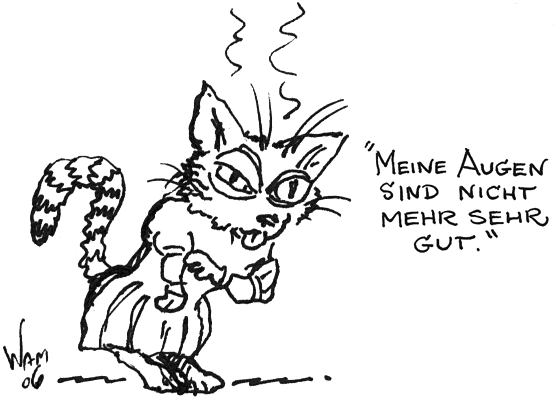5.5.1.1: nominative possessive determiners
- Page ID
- 108121
Determiners:Possessivpronomen Als Artikel - Nominativ
Possessive determiners (they are actually not pronouns unless they replace a noun!) are similar in function to definite and indefinite articles. They precede nouns and provide additional information about that noun, specifically, who owns them ...
| die Katze | Meine Besitzerin hat mich hinausgeworfen. Ich bin leider zu alt! | My owner threw me out. I am unfortunately too old! |
| der Hund | Was ist ihr Problem? | What is her problem? |
These are the basic forms of the possessive determiners:
| ich | mein | my |
| du | dein | your |
| er | sein | his |
| sie | ihr | her |
| es | sein | its |
| wir | unser | our |
| ihr | euer | your (think 'you guys') |
| sie | ihr | their |
| Sie | Ihr | your (formal) |
Gender and the Possessive Determiners
Once you have identified who owns what or whom you are talking about, you need to add the appropriate endings to the possessive determiners, based on the gender of the noun being owned... In English, there are no different endings, of course. But in German, here is what happens to mein (my), for example, when it encounters nouns of different genders/numbers (remember, these are grammatical genders, not biological ones!):
| Mit der Katze ist viel los ... (the cat has lots of problems) | ||
| masculine | Mein Kopf tut mir weh. | My head hurts. |
| feminine | Meine Zunge ist immer trocken. | My tongue is always dry. |
| neuter | Mein Haar wird immer verfilzter. | My hair is getting more and more matted. |
| plural | Meine Augen sind nicht mehr sehr gut. | My eyes aren't very good any more. |

So ...
Step 1: Choose the correct possessive determiner based on who owns X (mein, dein, sein, etc.).
Step 2: Choose the correct ending, based on the gender and number of the noun that is being owned.
Here are the endings for the possessive determiners:
| masculine noun follows (no visible suffix) |
feminine noun follows (-e suffix) |
neuter noun follows (no visible suffix) |
plural noun follows (-e suffix) |
| mein Kopf | meine Zunge | mein Haar | meine Augen |
| dein Kopf | deine Zunge | dein Haar | deine Augen |
| sein Kopf | seine Zunge | sein Haar | seine Augen |
| ihr Kopf | ihre Zunge | ihr Haar | ihre Augen |
| sein Kopf | seine Zunge | sein Haar | seine Augen |
| unser Kopf | uns(e)re Zunge | unser Haar | uns(e)re Augen |
| euer Kopf | eu(e)re Zunge | euer Haar | eu(e)re Augen |
| ihr Kopf | ihre Zunge | ihr Haar | ihre Augen |
| Ihr Kopf | Ihre Zunge | Ihr Haar | Ihre Augen |
If unser or euer precedes feminine or plural nouns, the original -e- may be left out.
Possessive Pronouns
Possessive determiners can replace an entire noun phrase; in this case, they become possessive pronouns (such as the English examples: Where are my glasses? On your nose, and where are mine?). Here is an example set with mein/meiner:
Der Hund hat Mitleid! (the dog can sympathize)
| masculine | Mein Kopf tut mir weh. | Meiner tut mir auch weh! | Mine hurts too! |
| feminine | Meine Zunge ist immer trocken. | Meine auch! | Mine is too! |
| neuter | Mein Haar wird immer verfilzter. | Meines auch! | Mine too! |
| plural | Meine Augen sind nicht mehr sehr gut. | Meine sind auch nicht sehr gut! | Mine are also not very good! |
The endings on the possessive pronouns are the same as der-words.
Gehören + dative as an alternative to possessive determiners
You can also express possession with the verb gehören. For details, see gehören under dative verbs, but here are two quick examples:
gehören + dative = possessive determiner
| die Katze | Wem gehört dieser Wecker? | Who does this alarm clock belong to? |
| der Esel | Wem, wem ... er gehört natürlich dem Haushahn! | Who, who ... naturally it belongs to the rooster! |
| die Katze | Das ist sein Wecker? Warum braucht ein Haushahn einen Wecker? | It's his alarm clock? Why does a rooster need an alarm clock? |


